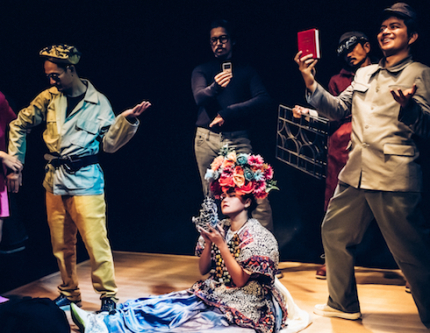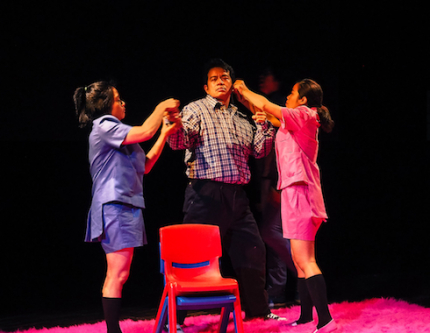I have never been a fan of hipster culture – I find its ‘ideologies’ are contradictory and hypocritical in that anti-fashion has become fashionable and anti-establishment has gained a firm grounding as an established sub-culture. By that logic then, Hipster philosophy is surely anti-academic and rebels against intellectualism. Empty words based on empty thoughts based on creating a public image through rebelling against it. So it was with curious intrigue that I went to watch Thanapol Virulhakul’s acclaimed “Hipster The King”.
The theatre show can better be described as a performance installation and features a number of actors who pose like statues on stage. Each of the actors are dressed in grandiose costumes and introduced by surtitles above the stage as hipster idols who are there to love and serve us, the audience – yet they do nothing. The audience is also assured that the Hipster Kings are not standing still, but quietly dancing.
The game is set. The rules are explained. But still no one knows what is really going on. The characters remain silent. This unsettles some audience members who shift awkwardly in their seats. I have a different reaction – Hipsters without an opinion? Bring it! I immediately relax, let down my guard and sit back to absorb the show.
The rules seem as follows: the director has “forced” the characters to remain stuck in their positions, unless of course the audience decide to help them. The hipster kings are only allowed to rest when either the audience applaud them to a full standing ovation or else an audience member volunteers to take their place on stage. Standing still, however, is no mean feat, as two youthful hosts enter the theatre repeatedly to give the actors elaborate and heavy props, objects and awkward accessories for the hipsters to hold while they stand; caught in their frozen tableaus.
The surtitles also reveal that the show will only end when there are no actors left on stage. Consequently the hipster kings take turns to leave the stage to rest, stretch and change costumes. Throughout the performance these Hipster idols slowly reappear on stage in various hipster outfits – often representing iconic “hipster” figures, including Che Guevara, Frida Kahlo and even Steve Jobs. They are there to serve the audience, yet it is up to the audience to determine their own enjoyment of the show.
Eventually their costumes are stripped down layer by layer to plain t-shirt and shorts – the hipster kings exhausted, de-rolled, de-fashioned, disarmed and disempowered – after all the true power lies in the leadership or engagement of the audience.
So will you enjoy it? I guess that choice is really up to you.
Photos by Christian Hogue



